What's the best character class and faction in Dragon Age: The Veilguard? When you start a new game, your initial choice of class and faction is important; both decisions have a significant impact on how the game actually plays, and you're completely locked in once you proceed past the character creation system.
In this Dragon Age: The Veilguard guide, we're going to break down the pros and cons of each class and faction. Hopefully, our experience with the game will help you decide on who you want your Rook to be.
What's the Best Character Class and Faction in Dragon Age: The Veilguard?
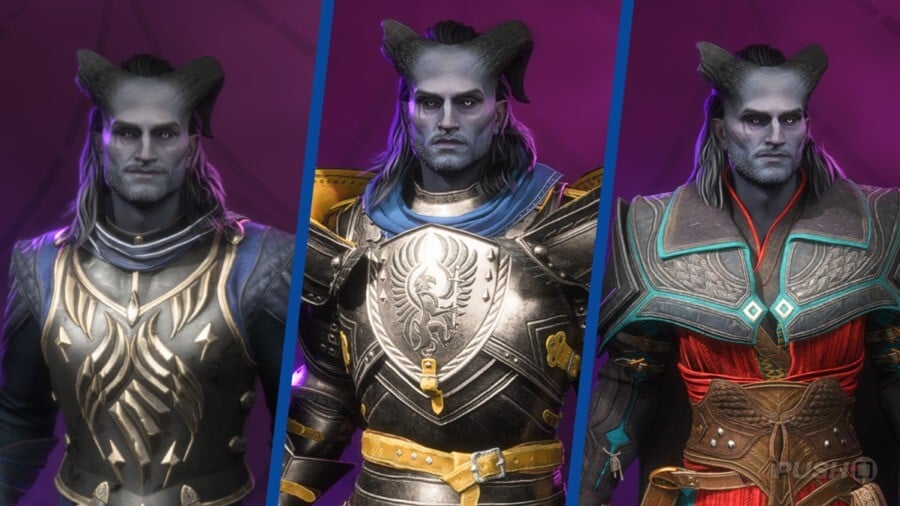
Deciding on the best class and faction for your Rook is really going to depend on your own playstyle. The problem is that you don't get a chance to actually sample the game's three character classes — Warrior, Rogue, and Mage — before making your hero.
Below, we've detailed each class and faction choice as best we can.
What's the Best Class to Choose in Dragon Age: The Veilguard?
As mentioned, you get to choose between three classes when creating Rook. Each of these classes are distinct in the way that they can play, the weapons that they use, and the skills that they can learn.
Basically, being a Warrior is a lot different to being a Mage. Depending on which class you choose, you'll need to think differently about combat encounters throughout the entire game.
Again, your class cannot be changed once you finalise your character.
Warrior
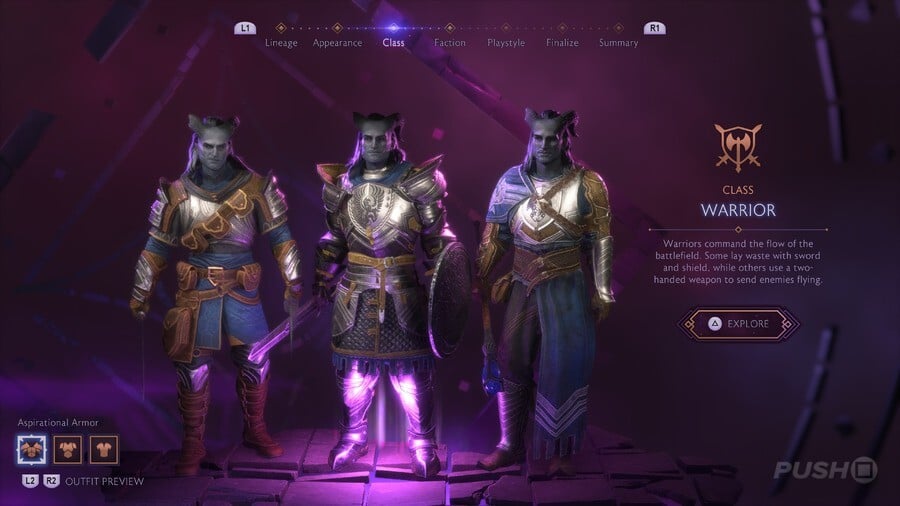
Warrior is your typical frontlines fighter. A beast in melee combat, with strong attack combos, great defensive options, and pure survivability. Warrior is probably the most straightforward class to actually play.
Weapons:
- One-handed swords and axes (right hand)
- Shields (left hand)
- Two-handed greataxes and mauls
You can switch between your one-handed and two-handed weapons at any time by pressing down on the d-pad.
One-handed weapons are fast and versatile, letting you dodge out of standard attacks, or instantly block (or parry) with your shield, even during a combo. You can also attack using your shield, bashing enemies for high stagger damage.
Two-handed weapons boast high damage but slow attack speeds. Greataxes typically have higher damage numbers, but mauls deal greater stagger damage. Some of your attacks also have armour — meaning that you can power through incoming blows. You can't block with two-handed weapons, but you can parry.
For ranged attacks, Warriors can throw their shield, before it boomerangs back to them. Even if you're using a two-handed weapon, you can throw a magical shield that functions in the same way as a normal one.
Resource:
Warriors use Rage to fuel their skills. Rage is gained whenever you deal or take damage, and so it's very easy to build up. It does drain outside of combat, however, unless you unlock specific perks.
Skills:
Warriors learn skills that can control the battlefield — mostly by knocking down enemies — or deal big damage in one strike.
In terms of character builds, you can spec into things like stagger damage, crowd control, and defensive techniques.
- The hardest class to kill, thanks to a combination of strong defensive options and high HP
- Very easy to play on a fundamental level
- Rage is the easiest resource to manage in the game
- Blocks and parries can be executed immediately, even when you're attacking
- Heavy attacks (with a shield or two-handed weapons) will stagger most normal enemies
- Charged heavy attacks can knock down, or even smash smaller foes away
- Wide two-handed attacks are perfect for hitting multiple enemies at once
Warrior Weaknesses:
- You need to be good at parries to get the most out of playing a Warrior
- Ranged attacks are lacking compared to other classes
- Ranged enemy types are a pain to deal with, as you'll need to close the distance constantly
Rogue
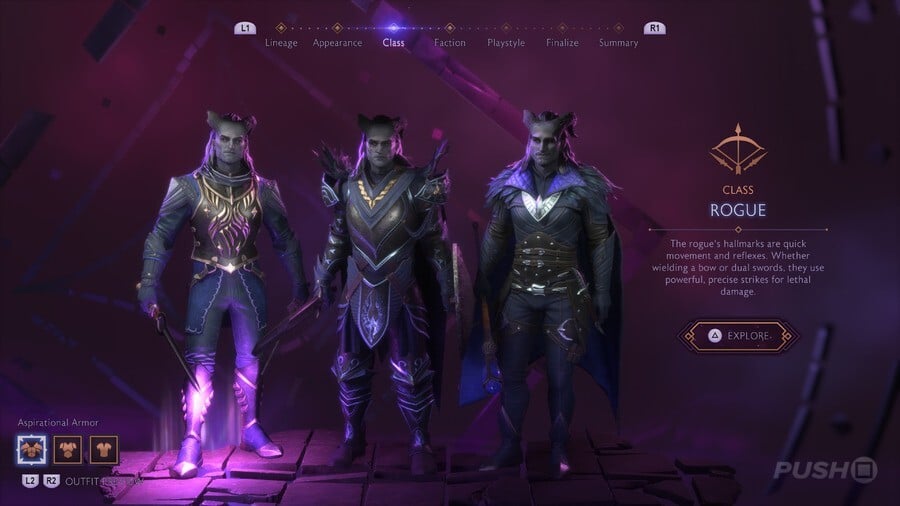
Rogue is an aggressive class that's mostly about dealing big damage in quick bursts. Rogues are solid in melee combat, but they truly excel when you factor long-range bow attacks into your play. A deadly and versatile class.
Weapons:
- One-handed swords (which you dual wield)
- Bows
Rogues don't need to switch between their swords and bows — you just hold down R2 for your ranged option.
One-handed swords are fast and combos come easily. You can dodge or parry at any time during a standard combo, while heavy attacks are a little slower, but deal increased damage and can knock enemies back.
Bow attacks can be used to hit enemy weakpoints at range for potentially huge damage. You can also just tap R2 to fire off a quick shot in the direction of your nearest opponent. These shots don't have the accuracy of aiming manually, but they're great for quick, additional damage.
Your bow is limited by the number of arrows that you have. You don't have to buy or craft arrows; arrows are essentially a resource that recharges over time (both in and out of battle), or through the use of specific skills.
Resource:
Rogues use Momentum to power their skills. Momentum builds quickly as you attack, but stops whenever you get hit. It essentially rewards aggressive, but careful play.
Skills:
Rogues can make use of a wide range of skills, most of which offer big damage and relatively short cooldowns.
In terms of character builds, you can spec into things like traps that control the battlefield, skill spamming for maximum damage output, and afflictions that cause damage over time.
Rogue Strengths:
- Effective at any range
- Huge damage potential between hitting weakpoints with the bow, and making efficient use of cooldown-based skills
- Fast combos make it easy to back away when necessary
- Parries can be executed immediately during standard combos
- Has no real weakness in terms of enemy types
Rogue Weaknesses:
- Middling HP
- No way to block incoming attacks; dodge and parry timing is essential
- Aiming has to be on point for full bow damage
Mage
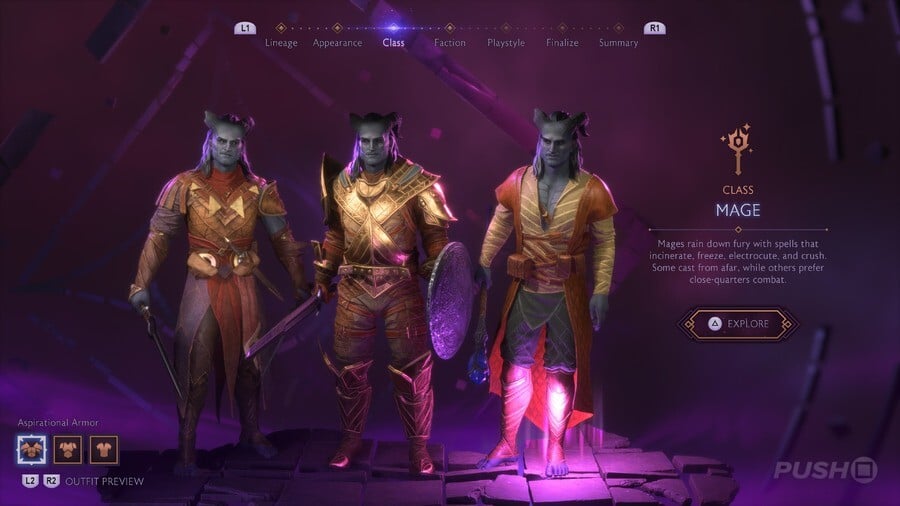
Mage is your spellcasting class, but with a bit of a twist. Between a projectile-flinging staff and a much quicker orb and dagger combination, the Mage is a surprisingly versatile, technical class.
Weapons:
- Two-handed staves
- One-handed orbs (right hand)
- One-handed daggers (left hand)
Like Warriors, Mages can switch between their staff and orb-dagger combo by pressing down on the d-pad. This can be done at any time.
Two-handed staves are essentially long-range weapons that shoot magical projectiles from a distance. These projectiles rarely stagger foes and so correct positioning is important. Heavy staff attacks unleash a wave of energy, designed to stagger enemies back if they get too close.
Staves build up magical power as you chain standard attacks together. Once the tip of your staff is glowing, your charged of heavy attacks are more potent, and can inflict afflictions upon your enemies.
When using a staff, you can summon a magical barrier to block incoming attacks from all directions. However, the barrier weakens as it absorbs damage, and can break — depleting all of your Mana in the process.
Orbs and daggers are used in combination. Standard attacks send out fast, medium-range magic projectiles from your orb. When they connect, your target is given an orb 'counter' next to their HP bar. When they have three counters, you can detonate the magical energy with your dagger's heavy attacks for additional damage.
With your orb and dagger equipped, you can't block, but you can parry.
Resource:
Mages use Mana to fuel their skills. Mana replenishes automatically after a short delay, and it must be properly managed since there's no immediate way to charge it back up.
Skills:
Mages mostly deal in destructive magical blasts, but they can also gain access to crow-controlling area-of-effect spells.
In terms of character builds, you can spec into things like pure skill damage, increased mana generation so that you can spam skills, and even melee-based magic for use with your orb and dagger.
Mage Strengths:
- Incredibly versatile between its two weapon types
- Can pin down smaller foes at a distance, stopping them from ever getting close
- Has some of the highest damage skills in the game
- Has a short teleport instead of a dodge roll, which lets you pass through smaller enemies
- The orb and dagger have some of the fastest attacks in the game
- Requires patience, but building towards explosive damage through normal attacks and combos is very effective against boss enemies, or foes with a lot of HP
- Mages get some unique dialogue options that Warriors and Rogues don't
Mage Weaknesses:
- Low HP
- Staves are a relatively weak and vulnerable weapon type until later in the game, when the right perks make them much more effective
- Mana can be difficult to manage in more chaotic fights
- Probably the most difficult class to use effectively
What's the Best Faction to Choose in Dragon Age: The Veilguard?
Choosing the right faction for your Rook isn't as important as choosing the right class, but it does still have a noticeable impact on the game, both in and out of battle.
Depending on your faction, you'll gain specific advantages in battle. You'll also have unique dialogue options every now and then, and it'll be easier to increase the strength of the faction that you're a part of, mostly through side quests. Increasing a faction's strength gives you access to more equipment at that faction's shop.
Grey Wardens
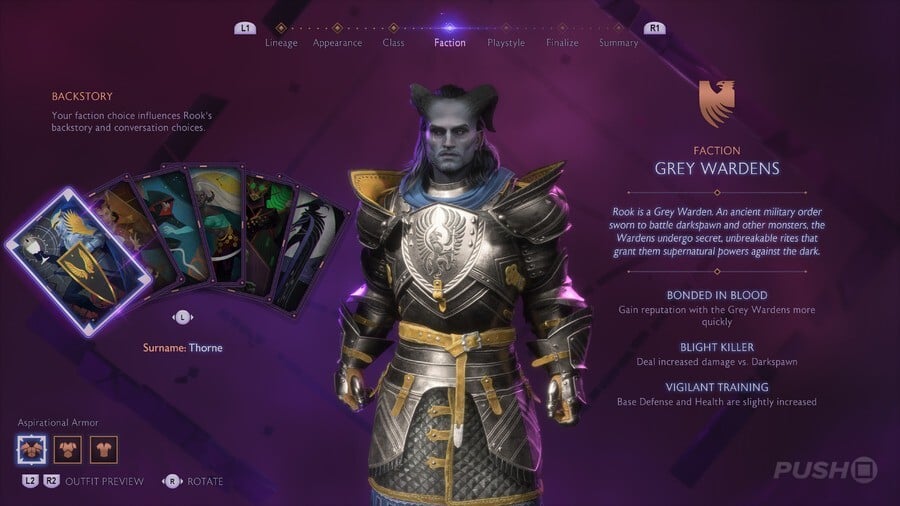
Advantages:
- Blight Killer
- Deal increased damage to Darkspawn enemies
This is a really good perk to have, because Darkspawn are the most common enemy in the game — or thereabouts. A flat damage increase isn't to be sniffed at, especially since Darkspawn battles tend to throw a lot of enemies at you.
- Vigilant Training
- Base defence and health are slightly increased
The additional stat bonuses are minor, but you can't really go wrong with a bit more survivability. Works best with Warriors, though, because they can get perks that bolster your defensive stats based on existing values.
Veil Jumpers
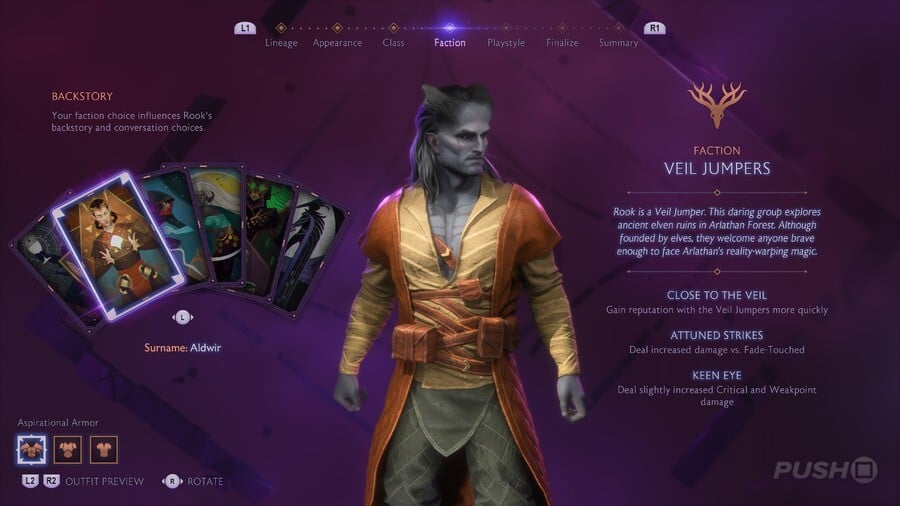
Advantages:
- Attuned Strikes
- Deal increased damage to Fade-Touched enemies
Fade-Touched enemies aren't that common, especially later in the game. But at the same time, they can be tricky opponents when they do show up. We don't think this bonus is quite as useful as others, but it's not bad.
- Keen Eye
- Deal slightly increased critical and weakpoint damage
This bonus is nice to have on any class, but it's especially effective for Rogues because of how much weakpoint damage you can already rack up with your bow.
Shadow Dragons
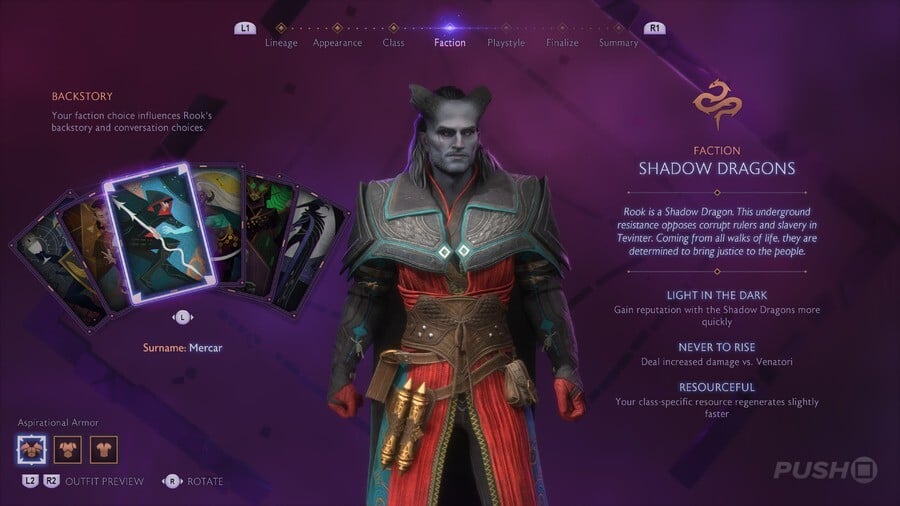
Advantages:
- Never to Rise
- Deal increased damage to Venatori enemies
Venatori are common opponents throughout the game, and some of the stronger Venatori can be a real handful. Being able to kill them off that much faster is a worthwhile boon.
- Resourceful
- Slightly increases your class' resource generation
This is a great bonus to have on any class. The additional resource generation is very minor, but it can rack up over time with the right perks. In particular, Mages can get effective use out of this one, because their Mana needs to be managed a little more carefully.
Lords of Fortune
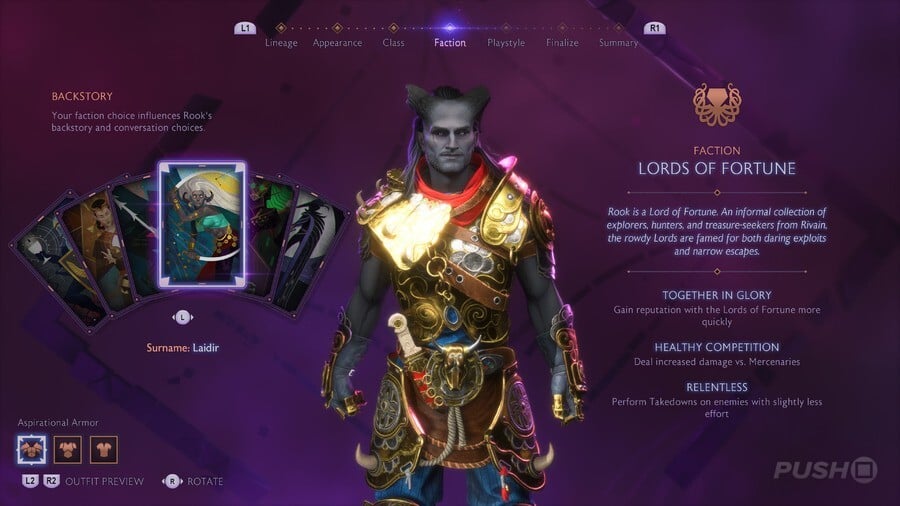
Advantages:
- Healthy Competition
- Deal increased damage to Mercenary enemies
Mercenaries are probably the rarest set of enemies in the game, so this bonus is immediately called into question when weighed against others. That said, Mercenaries can be troublesome, with deceptive attacks that require precise timing to parry.
- Relentless
- Takedowns require slightly less effort
We've got to be honest, we're not sure what this bonus actually refers to. Takedowns occur when an enemy's stagger gauge is full (following repeated attacks). If this perk means that you deal more stagger damage across the board, that's a great bonus to have on any class. Takedowns can deal huge damage, and they're an efficient way to bring down bulkier foes.
But if it's to do with the distance that you can perform a takedown from, or something similar, then this perk's not really worth it.
The Mourn Watch
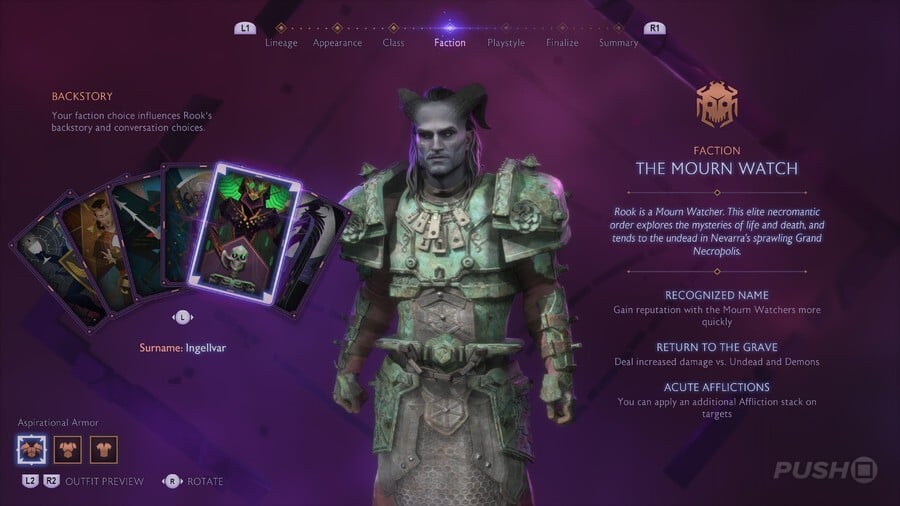
Advantages:
- Return to the Grave
- Deal increased damage to Undead and Demon enemies
Undead enemies are somewhat rare compared to other opponents, but Demons are all over the place. Generally speaking, Undead foes are quite easy to deal with, but Demons come in all shapes and sizes, and they're often a threat. One of the better 'increased damage' bonuses.
- Acute Afflictions
- You can apply one additional affliction stack on enemies
Afflictions can make a big difference to tough fights. Bleeding, burning, and necrosis all deal damage over time, while afflictions like sunder and overwhelm reduce a foe's stats. One more stack of whichever affliction you specialise in is often noticeable, and so this is great for builds that focus on inflicting additional pain.
Antivan Crows
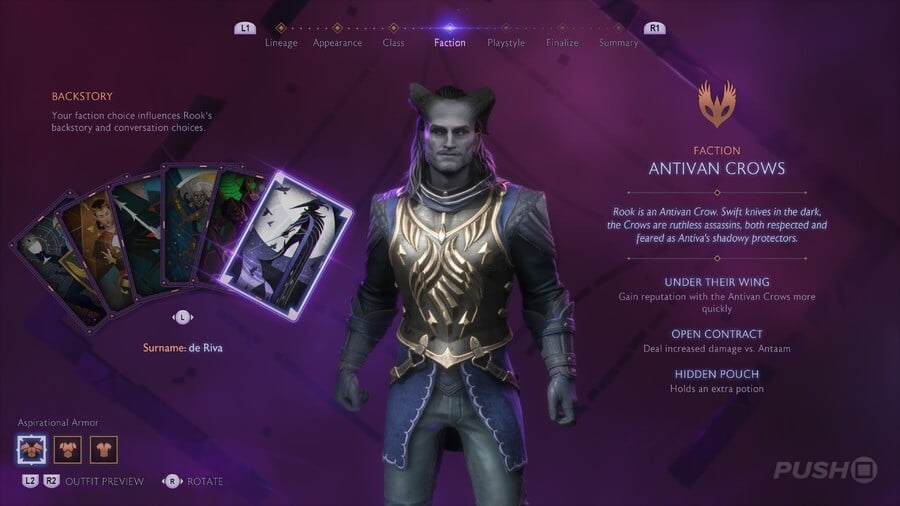
Advantages:
- Open Contract
- Deal increased damage to Antaam enemies
The Antaam are fairly uncommon enemies, but they can be difficult to deal with when they do show up. Not a bad bonus.
- Hidden Pouch
- Carry one additional potion
By default, all classes carry three potions with which to heal their HP. Having one more can be a difference-maker in especially difficult battles, but this perk loses its value as you progress further into the game. That's because you'll unlock more avenues of restoring your HP, whether it's through companion skills or your own.
What's more, skilled players might not even need three potions — never mind four. As such, this bonus is only truly worthwhile if you want maximum survivability.
Did this guide help you decide on the best class and faction in Dragon Age: The Veilguard? Be sure to check out our Dragon Age: The Veilguard guide for more help with the game, and then tell us all about your Rook in the comments section below.





Comments 2
Thanks a ton Robert for this. I guess I'll go with either Shadow Dragon Mage or Veil Jumper Rogue.
I hear this has the ME3 priming-detonating mechanic so it's disappointing to know there are no hybrid classes. This feels like DA2 all over again.
Also had the idea of a close range mage that nobody ever really does in RPGs. Imagine a mage that fights like an assassin but fires off magic in their combos.
Leave A Comment
Hold on there, you need to login to post a comment...